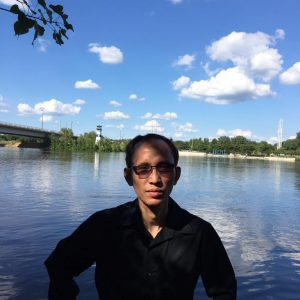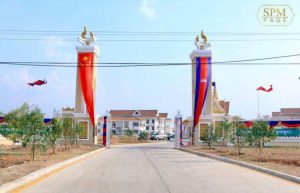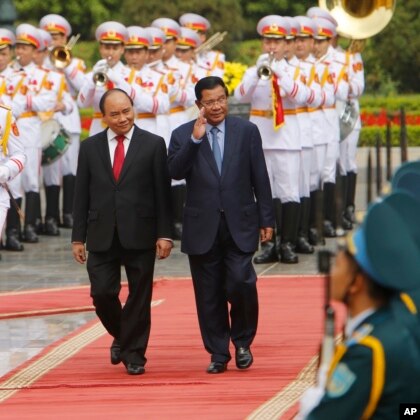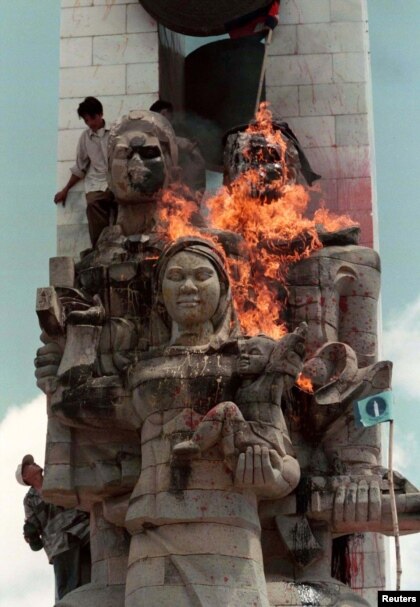Op-Ed: The CEROC
កិច្ចព្រមព្រៀងសន្តិភាពទីក្រុងប៉ារីសនិងការស្លាប់នៃលទ្ធិប្រជាធិបតេយ្យអាណត្តិទី៦នេះ

ខ្ញុំបាទខេង គិមស្រ៊ាន ថ្ងៃនេះមានកិត្តិយសតាងនាមអោយគណៈកម្មការដើម្បីសិទ្ធិបោះឆ្នោតរបស់ពលរដ្ឋខ្មែរនៅក្រៅប្រទេសឬដែលហៅកាត់ថាដឺស៊ីរ៉ក់ក៏ដូចជាលោកសេង សុភ័ណដែលជាប្រធាន មកជាវាគ្មិនក្នុងមហាសន្និបាតខ្មែរពិភពលោកលើកទីពីរនៅរដ្ឋមិននីសូតានេះ។
បងប្អូនជនរួមជាតិជាទីគោរពរាប់អាន ពិភពលោកបានចេញចាកផុតពីយុគសង្រ្គាមត្រជាក់ឈានចូលយុគបច្ចុប្បន្ន ហើយកម្ពុជាដ៏អភ័ព មួយនេះបានស្គាល់ពន្លឺប្រជាធិបតេយ្យខ្លះក្រោមការជ្រោមជ្រែងរបស់អង្គការសហប្រជាជាតិអោយមានការបោះឆ្នោតនៅឆ្នាំ១៩៩៣ទៅតាមកិច្ចសន្យា នៃកិច្ចព្រមព្រៀងសន្តិភាពទីក្រុងប៉ារីស២៣ តុលា ១៩៩១។ កាលនោះ ប្រជាពលរដ្ឋខ្មែរនៅក្រៅប្រទេសបានមានសិទ្ធិចូលរួមបោះឆ្នោតយ៉ាងពេញ លេញ តែក្រោយៗមកក្រោមការដឹកនាំនៃគណៈកម្មការជាតិរៀបចំការបោះឆ្នោតឬគជប ប្រជាពលរដ្ឋខ្មែរនៅក្រៅប្រទេសមិនត្រូវបានគេផ្តល់សិទ្ធិ អោយចូលរួមបោះឆ្នោតឡើយ។ ចាប់កំណើតកាលពីឆ្នាំ២០១៤ ស៊ីរ៉ក់បានធ្វើកិច្ចការជាច្រើនក្នុងការធ្វើយុទ្ធនាការប្រមូលញត្តិពីបងប្អូនយើងនៅក្រៅ ប្រទេសទាំងអស់ ក្នុងនោះក៏មានបងប្អូនយើងជាច្រើននៅរដ្ឋមីននីសូតាបានចូលរួមចុះហត្ថលេខា ហើយយើងខ្ញុំសូមថ្លែងអំណរគុណយ៉ាងជ្រាល ជ្រៅនៅទីនេះ, យើងបានជួបពិភាក្សាជាមួយគជបថ្មីមានលោកគួយ ប៊ុនរឿន លោករ៉ុង ឈុនជាដើម ហើយយើងបានសរសេរលិខិតទៅកាន់ប្រធានក្រុម តំណាងរាស្ត្រគណបក្សសំលេងភាគតិចគឺលោកស៊ុន-ឆ័យនៃគណបក្សសង្គ្រោះជាតិ។ ពង្រាងច្បាប់មួយបានកើតឡើងដាក់ចូលសភាដើម្បីធ្វើវិសោធ នកម្មតូចមួយដែលអាចអោយពលរដ្ឋខ្មែរនៅក្រៅប្រទេសអាចមានសិទ្ធិបោះឆ្នោតបាន។ តែជាអកុសល ក្រោមការដឹកនាំរបស់លោកហ៊ុន-សែន មិនមែនតែពលរដ្ឋខ្មែរនៅក្រៅប្រទេសទេដែលត្រូវបានគេផាត់ចោលនិងព្រងើយកន្តើយ ពលរដ្ឋខ្មែរនៅក្នុងប្រទេសក៏ត្រូវបានគេលាបព៌ណនិងធ្វើទុក្ខបុកម្នេញគ្រប់បែបយ៉ាងដោយគ្រាន់តែពួកគេមាននិន្នការគាំទ្រគណបក្សជំទាស់ឬនិន្នាការកណ្តាលដូចជាក្រុមសង្គមស៊ីវិល។
មកដល់ថ្ងៃនេះគឺ២៧ឆ្នាំហើយក្រោយកិច្ចព្រមព្រៀងសន្តិភាពទីក្រុងប៉ារីស ដែលប្រទេសកម្ពុជាក្រោមការដឹកនាំរបស់លោកហ៊ុន-សែន បានបំផ្លាញចោលលទ្ធិប្រជាធិបតេយ្យសេរីពហុបក្សចោលដោយសារតែមើលឃើញថាគណបក្សជំទាស់គឺគណបក្សសង្គ្រោះជាតិអាចមានប្រជាពល- រដ្ឋគាំទ្រច្រើនជាងខ្លួនបើទុកអោយមានការប្រកួតប្រជែងការបោះឆ្នោតមួយដោយសុក្រឹតត្រឹមត្រូវនិងយុត្តិធម៌។ ការបោះឆ្នោតថ្ងៃ២៩ កក្កដា ២០១៨ គឺជាឆាកល្ងោនប្រជាភិថុតបោកប្រាស់ប្រជាពលរដ្ឋខ្មែរថាមានពហុបក្សតែប៉ុណ្ណោះ។ តែតាមការពិតប្រជាពលរដ្ឋខ្មែរនិងសហគមន៍អន្តរជាតិមិនអាច ទទួលយកបាននូវរបបដឹកនាំបែបឯកបក្សនិងផ្តាច់ការនេះបានទេ។ ក្រោមការជួយជ្រោមជ្រែងពីសហគមន៍អន្តរជាតិជាពិសេសប្រទេសហត្ថលេខីនៃ កិច្ចព្រមព្រៀងសន្តិភាពទីក្រុងប៉ារីស ប្រជាពលរដ្ឋខ្មែរទាំងក្នុងប្រទេសនិងក្រៅប្រទេសប្តេជ្ញាប្តូរប្តាច់អោយមានការបោះឆ្នោតឡើងវិញ មានការចូល រួមពីគណបក្សសង្គ្រោះជាតិ មានការដោះលែងលោកកឹម-សុខានិងអ្នកទោសនយោបាយទាំងអស់ ទុកជាមោឃៈនូវច្បាប់ទាំងឡាយណាដែលផ្ទុយ ពីរដ្ឋធម្មនុញ្ញ និងអនុវត្តន៍ជាក់ស្តែងតាមរដ្ឋធម្មនុញ្ញដើម្បីអោយតុលាការឯករាជ្យ ពង្រឹងសមត្ថភាពស្ថាប័នព្រះមហាក្សត្រ មន្ត្រីរាជការទាំង ស៊ីវិលនិងកងប្រដាប់អាវុធត្រូវតែអព្យាក្រិត-ឯករាជ្យជាដើម។ សូមអរគុណជាអនេកកប្បការ! ថ្ងៃទី៤ ខែសីហា ២០១៨
View the speech through Youtube Channel of Cambodians Overseas





 Op-Ed:
Op-Ed: